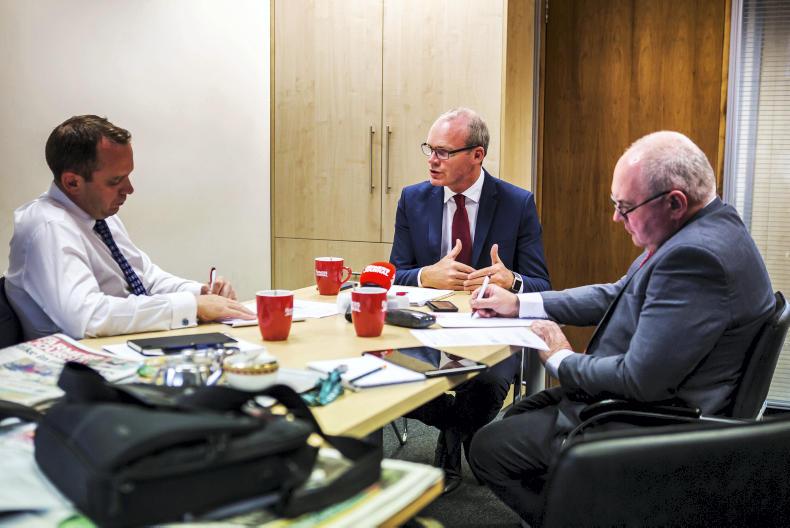In a wide-ranging interview with the Irish Farmers Journal, An Tánaiste and Minister of Foreign Affairs with responsibility for Brexit Simon Coveney expressed confidence in a deal being secured between the European Union and the UK for future trade after Brexit.
In the worst-case scenario of no deal being agreed – which he thinks is unlikely – the Tánaiste said that the Government and EU were very aware of the exposure of Irish farmers to the British market, and while it was the role of the Irish Government to protect all interests, “farming and agri food were probably the most vulnerable sectors and a big part of our contingency planning”.
North–south v east–west trade
The Irish Farmers Journal put it to the Tánaiste that the controversial “backstop” designed to protect trade on the island of Ireland was fine in as far as it went, but for farmers in this jurisdiction, access to the market in Britain for all commodities was even more important.
In repose, the Tánaiste said that the Government position on the Irish border is because agriculture is part of an all-Ireland economy, and this has full endorsement from all parts of the EU.
He referenced comments by the president of the European Council, Donald Tusk, and European Commission president Jean Claude Junker, as well as pointing out that the EU’s chief negotiator on Brexit, Michel Barnier, had probably spent as much time on the Irish issue alone as he had on the rest of Brexit issues.
Stalemate between EU and UK
Much of the focus at present is on comments made by UK Conservative MP David Liddington that the Chequers proposal was more or less the UK’s bottom line, describing it as the “only alternative to no deal”, and respective comments by Barnier that he is “strongly opposed” to it. We put these positions to the Tánaiste, explaining that from an Irish farmers’ perspective, we could see merit in the proposals and had said so when they were initially produced. He, too, was well disposed towards the proposals recognising that they would solve all aspects of trade between Ireland and Britain, as well as on the island of Ireland.
He went on to say: “If the UK leaves, we want the closest trading relationship with the fewest if any barriers,” and that “the White Paper [Chequers proposals]is a step in the right direction”. In recognising that an arrangement that covered goods and agricultural produce would be good for Ireland and our trade with the UK, the Tánaiste also accepted that the EU would see it as potentially undermining the principles of the four freedoms of the single market, as well as being unclear on how disputes would be solved and the role of the European Court of Justice.
Common rulebook
When pushed on this difference, he recognised that whatever his view on suitability for Ireland, Barnier would have to be convinced that the single market wouldn’t be undermined.
However, so far the Tánaiste believes that the chief negotiator has done an excellent job for Ireland and he hoped that in 10 years’ time, the UK will still be closely aligned to the EU, even if it is no longer a member.
The Tánaiste noted the acceptance by the UK of a “common rulebook” as a positive development and a “big step” by the UK. He went further and added that being part of a common rulebook meant that the UK would have to maintain equivalence with CAP.
The Brexit bullock
The Irish Farmers Journal put it to the Tánaiste that farmers buying cattle to finish this winter would be taking many of them to the factory after the UK proposed date to leave the EU. The Tánaiste said that while he couldn’t give guarantees, it was his judgement that there would be a deal and that the consequences of not having a deal would really focus minds on finding a compromise and a way forward. While saying a deal was the likely outcome, he did recognise that it would be extremely tight in the timeframe available to the end of October.
He pointed out that they were preparing for different scenarios, including buying more time, but for him the guiding principle was protecting Ireland’s relationship with Britain while making sure that our place in the EU remains solid and progressive in the years ahead.
When pushed again on the position of the “Brexit bullock” going to the factory after the UK has left the EU, the Tánaiste again referred to his belief that there will be a deal and if not, the understanding was clear in the EU and the Irish Government on the vulnerability of Irish farming, whose main market is the UK.
He also referenced his time as Minister for Agriculture and his understanding of the importance of family farm incomes.






 This is a subscriber-only article
This is a subscriber-only article










SHARING OPTIONS: